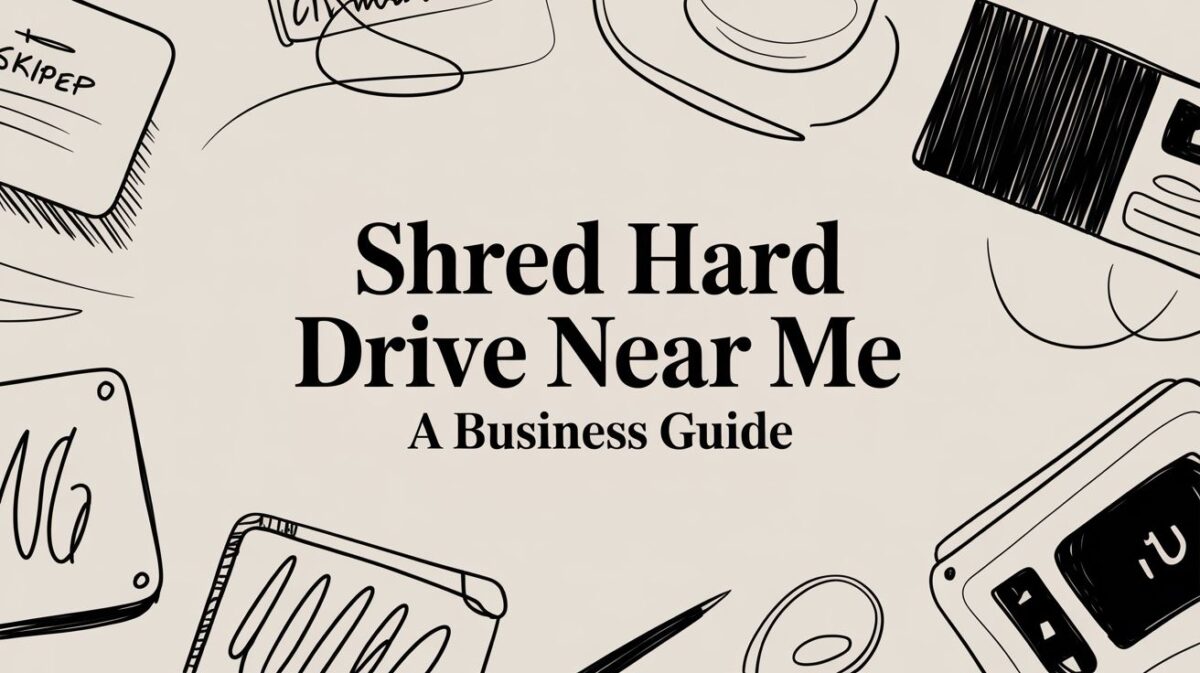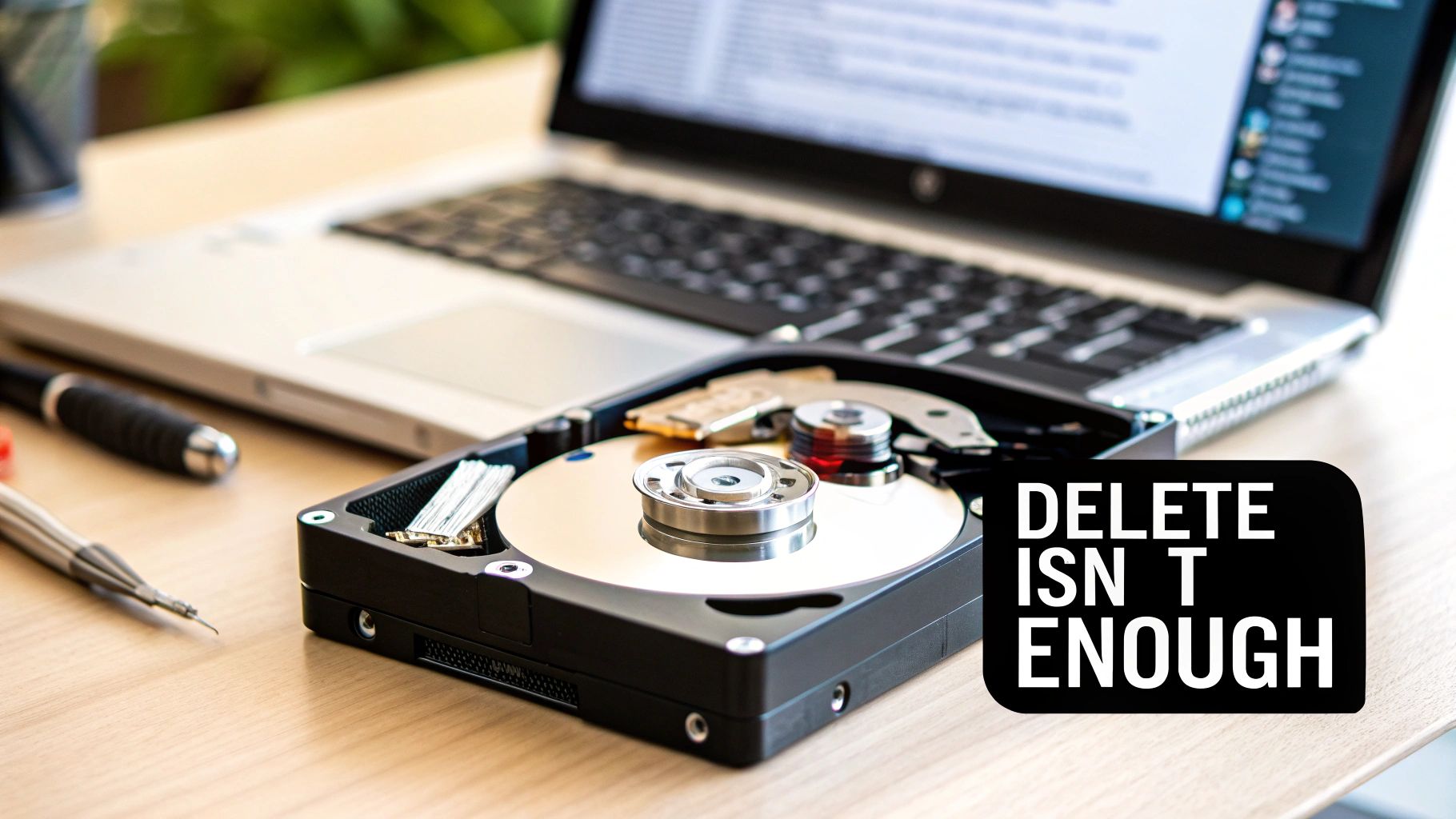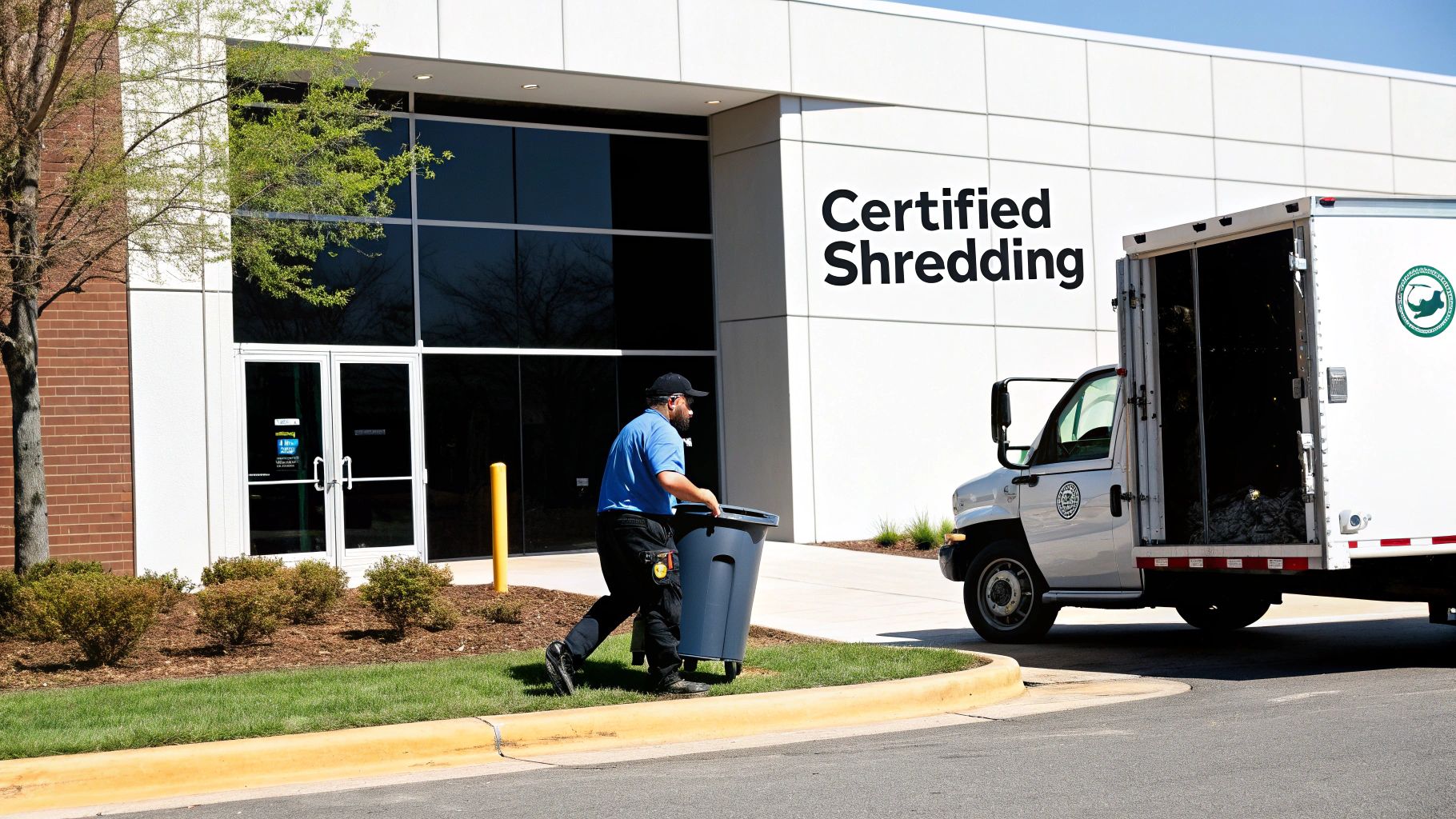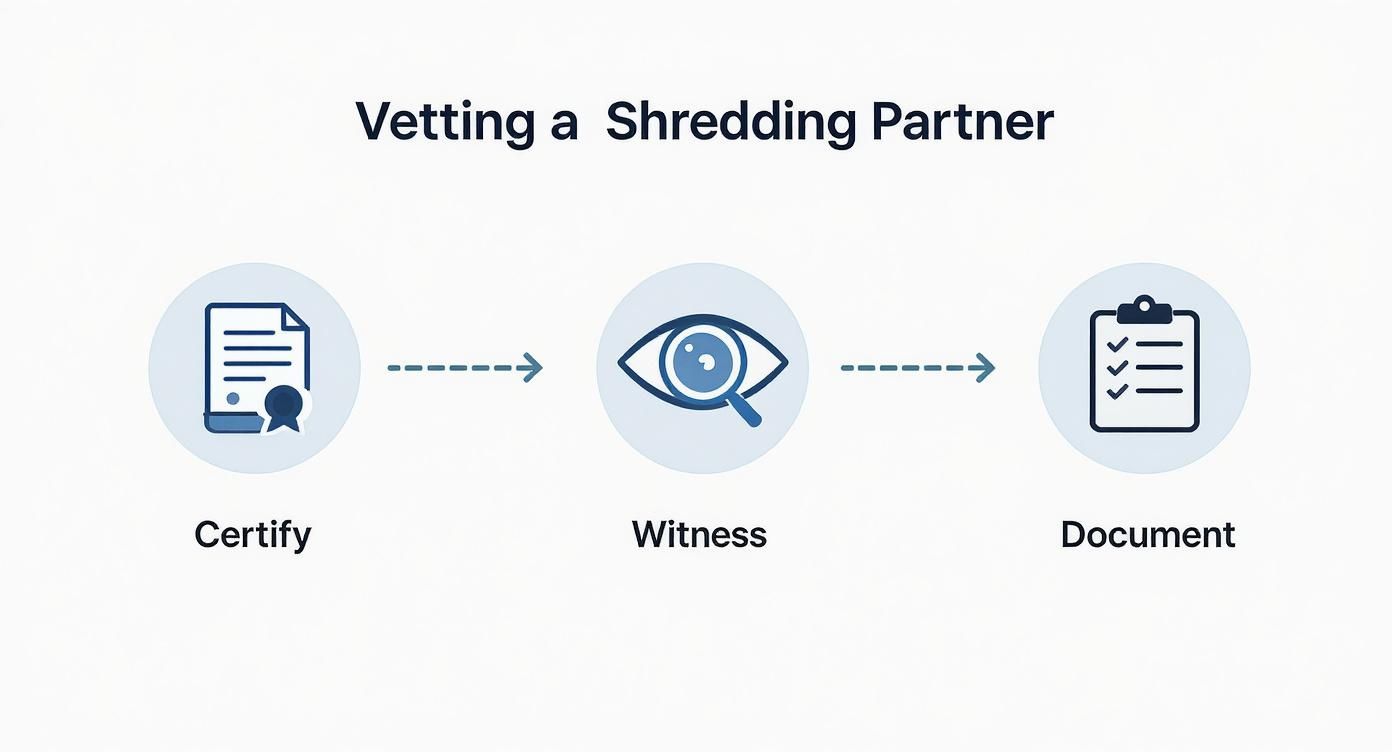Shred Hard Drive Near Me: A Guide for Corporate Data Security

It’s a common—and dangerously wrong—assumption to think hitting 'delete' or reformatting a drive is enough to protect your business data. For any company, true data security demands the physical destruction of old hard drives. It's the only way to make absolutely sure that sensitive corporate and client information is completely irrecoverable. Finding a professional service to shred a hard drive near you is a critical step in your corporate risk management strategy.
Why Your Business Can't Just Erase Old Hard Drives
Relying on software to wipe a drive or even degaussing it still leaves your business wide open. Even after a drive is reformatted, sophisticated recovery tools can often pull residual data right off it, creating a potential goldmine for cybercriminals.
For a business, this isn't just a minor oversight. It’s a direct threat to your clients, your finances, and your hard-earned reputation.
Picture this: a stack of decommissioned office computers gets sent off for recycling. If those drives weren't physically destroyed, they could easily fall into the wrong hands. The data pulled from them could include:
- Client Information: Names, addresses, and confidential project details.
- Financial Records: Company banking info, payroll data, and client invoices.
- Proprietary Data: Your trade secrets, internal strategies, and intellectual property.
A single data breach from one improperly discarded drive can cause catastrophic damage. Just look at the headlines. Thousands of data breach incidents in the U.S. have impacted billions of people globally. The big attacks carry massive costs; the Change Healthcare ransomware attack, for instance, incurred a response cost of around $2.87 billion.
Numbers like that are exactly why simply wiping data isn't good enough anymore. Businesses are demanding physical destruction.
The True Cost of a Data Security Failure
The fallout from a breach goes way beyond the initial incident. It’s a multi-layered corporate crisis. You're looking at steep regulatory fines, especially under laws like HIPAA or FACTA that mandate secure data disposal.
Beyond the financial hit, there’s the severe—and often permanent—damage to your company's reputation and the trust you've built with your clients.
Physical hard drive destruction isn't just an IT expense; it’s a fundamental part of your company's risk management and data security protocol. It’s the only method that gives you a verifiable, 100% guarantee that your data is gone forever.
Thinking about the different ways to handle old drives? You might be interested in our guide that explores various methods for how to erase a computer hard drive and how effective they really are.
Finding the Right Local Hard Drive Shredding Service
Just Googling "shred hard drive near me" will get you a list of results, but it’s not the most efficient way to find a true professional. To cut through the noise, you need to be more specific.
Try searching for terms like "NAID AAA certified shredding" or "on-site data destruction services." These keywords will help filter out the general e-waste collectors and point you directly to vendors who specialize in secure, compliant data destruction for commercial clients.
Once you’ve got a shortlist, you'll find that most providers fall into two camps: on-site mobile shredding or off-site plant-based shredding. Each has its own pros and cons, and the right choice really depends on your business's needs.
On-Site vs. Off-Site Destruction
On-site mobile shredding is pretty much what it sounds like. A specialized truck with a powerful industrial shredder built into it pulls up to your location. Your team can literally watch as your hard drives are fed into the machine and turned into tiny pieces of metal.
This method gives you an unbroken chain of custody and the ultimate peace of mind. It’s the gold standard for organizations with strict compliance mandates, like those in healthcare, finance, or government contracting.
On the other hand, off-site shredding involves a secure, GPS-tracked truck picking up your hard drives (usually in locked bins) and taking them to a secure facility to be destroyed. You don't get to witness the shredding firsthand, but this service is often more affordable, especially when you have a large volume of drives.
Any reputable vendor will provide a Certificate of Destruction afterward, giving you a documented audit trail.
The decision between on-site and off-site service boils down to your company's risk tolerance, compliance requirements, and budget. There's no single "best" answer—only what's right for your operational security.
On-Site vs Off-Site Shredding: Which Is Best for Your Business?
Use this comparison to decide which shredding model best aligns with your company's security, compliance, and logistical needs.
| Feature | On-Site Shredding | Off-Site Shredding |
|---|---|---|
| Security | Highest level; you witness the destruction. | High level; relies on a secure chain of custody. |
| Compliance | Ideal for strict regulations (HIPAA, PCI). | Meets most compliance needs with proper documentation. |
| Cost | Generally more expensive due to logistics. | Typically more cost-effective, especially for bulk jobs. |
| Convenience | Fast and immediate; done in one visit. | Requires scheduling pickup and transport. |
| Verification | Visual confirmation of destruction. | Verified through a Certificate of Destruction. |
Ultimately, a small business retiring a dozen laptops might find the convenience of an off-site pickup to be the perfect fit. But for a large corporation decommissioning a data center, the absolute certainty of on-site shredding is almost always non-negotiable.
For a broader perspective on managing these kinds of projects, our guide to computer disposal services near me offers more context on building a complete IT asset disposition strategy.
How to Vet a Professional Shredding Partner
Once you have a list of potential vendors to shred hard drives near you, the real work begins. Choosing a partner isn’t just about finding the lowest price—it's about selecting a vendor who minimizes your risk and guarantees compliance.
Making the wrong choice can lead to the very data breaches you’re trying to prevent.
Look for Non-Negotiable Credentials
First things first: look for the NAID AAA Certification. This is the industry's gold standard, and it's not just a fancy badge. It means a vendor has passed rigorous, unannounced third-party audits covering everything from employee background checks to the security of their facilities and vehicles.
A vendor without NAID AAA Certification is a significant gamble. It means there's no independent verification of their security protocols, leaving your company to shoulder all the risk.
Key Questions to Ask Potential Vendors
Beyond certification, you need to dig into their day-to-day processes. A true professional will have clear, confident answers to these questions. Use this as a checklist during your calls:
- Can my team witness the destruction process? For on-site shredding, this should be an absolute yes. If they take drives off-site, ask if they offer secure video verification.
- What does your chain of custody look like? They should be able to walk you through a secure, documented process from pickup to destruction. Look for details like locked containers, GPS-tracked trucks, and authorized personnel.
- What specific details are on your Certificate of Destruction? A legitimate certificate isn't just a receipt. It must include the date, location, method of destruction, a list of serialized hard drives, and an authorized signature.
- Are your employees background-checked and trained? The technicians handling your sensitive assets should be thoroughly vetted and trained on data security protocols. No exceptions.
These questions help you look past a slick website and evaluate the substance of their operations. The hard disk destruction equipment market is growing fast—projected to reach $4.23 billion by 2032—driven by intensifying global data protection regulations. This growth means more providers are entering the space, making diligent vetting more critical than ever. You can discover more insights about the hard drive destruction market on 360iResearch.com.
Choosing the right shredding vendor is just one piece of a larger e-waste strategy. For a broader view, explore our detailed comparison of top e-waste disposal companies to see how different services fit into a complete asset disposition plan. Your goal is to find a partner who acts as an extension of your security team, not just a disposal service.
Understanding the Process and Your Proof of Destruction
Knowing what to expect on shred day turns a daunting task into a manageable, secure process. When the technicians arrive, their first priority is establishing a strict chain of custody. This isn't just jargon—it's the foundation of secure disposal.
The first thing they'll do is inventory your assets and scan the serial number of every single hard drive slated for destruction. This step is non-negotiable.
Each scanned serial number gets logged, creating a detailed audit trail. This ensures every device is accounted for from the moment it leaves your control until it’s turned into tiny metal fragments. For any business concerned with compliance or internal security, that level of transparency is essential.
The Certificate: Your Ultimate Proof
Once the shredder has done its job, the vendor’s work isn't over. They are now required to provide you with a Certificate of Destruction. Think of this not as a simple receipt, but as a legally binding document that proves you handled your data disposal responsibly.
This certificate is your shield in an audit. For it to be worth the paper it’s printed on, it must include a few key details:
- A unique reference or job number.
- The exact date and location where the shredding occurred.
- A complete, itemized list of all shredded hard drive serial numbers.
- The signature of an authorized witness from the vendor.
This infographic breaks down what to look for in a shredding partner to make sure you get the right documentation every time.
As the graphic shows, proper certification, the ability to witness the destruction, and ironclad documentation are the three pillars of a secure shredding process. It all comes together to create a verifiable audit trail you can rely on.
For any business handling sensitive data under regulations like HIPAA, GDPR, or FACTA, the Certificate of Destruction is your single most important takeaway. It formally transfers liability for that data from your company to the shredding vendor, effectively closing the loop on your data security responsibilities.
It's worth getting familiar with what goes into this document. You can learn more about what a compliant Certificate of Destruction for hard drives should look like to ensure your business is fully covered. Without it, you're leaving your organization exposed to some pretty serious compliance penalties.
Why Secure Data Destruction Is a Growing Business Priority
Secure data destruction is no longer just a cleanup task for old equipment—it’s become a critical business decision. The explosive growth in this field signals a major shift in how companies view their responsibilities, driven by the rising tide of e-waste and much stricter data privacy laws.
The market numbers tell the story. The global hard drive destruction service market, currently valued at around USD 1.65 billion, is expected to skyrocket to approximately USD 5.05 billion by 2035. That’s a compound annual growth rate of 10.7%, fueled by the sheer volume of retired electronics and a global demand for secure, responsible disposal.
Aligning With Modern Data Protection
For modern businesses, professional shredding is a forward-thinking investment in corporate responsibility and proactive security, not just a compliance checkbox to tick off. It's really about aligning your operations with the data protection standards that customers and regulators now demand.
Properly disposing of assets is a core piece of this alignment. To see how this fits into your overall equipment lifecycle, our guide on what is IT asset disposition connects the dots between retiring old tech and protecting your business.
By prioritizing professional destruction, you are actively investing in your company’s reputation and resilience. It demonstrates a commitment to safeguarding sensitive information, which is a powerful way to build and maintain client trust.
Finally, remember that secure data destruction is one part of a larger security strategy. To protect all your business data effectively, it’s worth learning more about building a comprehensive Information Security Management System. This kind of framework ensures that finding a service to "shred hard drive near me" is part of a deliberate, organization-wide security posture.
Answering Your Hard Drive Shredding Questions
When businesses start looking for a "hard drive shredding near me" service, a few key questions always come up. Here are the clear, business-focused answers you need.
How Much Should I Expect to Pay?
The cost really depends on how many drives you have, but a good ballpark figure is anywhere from $7 to $15 per drive. Like most things, volume makes a difference—the more drives you have, the lower your price per unit will be.
Keep in mind that if you're getting on-site shredding, there's almost always a minimum service fee. That just covers the cost of bringing the mobile shredding truck and a certified technician out to your location.
Do We Have to Pull the Hard Drives Out Ourselves?
This is a big one, and the answer is: it depends on your vendor.
Some companies, especially full-service IT Asset Disposition (ITAD) specialists, will handle the entire process. For an added fee, they'll send a team to pull the drives from every desktop, laptop, and server. Others are pure shredding services and expect you to have the drives ready to go. You’ll want to clarify this right from the start to avoid any surprises or unexpected labor on your end.
Can You Shred More Than Just Hard Drives?
Absolutely. Professional shredders are designed to destroy a whole range of electronic media. We regularly handle:
- Solid-State Drives (SSDs)
- Backup tapes like LTO and DLT
- USB flash drives
- Old CDs and DVDs
- Company mobile phones and tablets
It’s really important to let your vendor know exactly what you need destroyed. SSDs, for instance, are made of tiny data chips and require a much smaller shred size than traditional spinning hard drives to ensure the data is 100% gone.
Your Certificate of Destruction is the single most important document you’ll receive. It’s your official, legally defensible proof that you did your due diligence to protect sensitive data. Don't even consider a vendor who doesn't provide one.
Is a Certificate of Destruction Really That Important?
Yes, it’s non-negotiable. This document is your official audit trail, proving you complied with data privacy laws like HIPAA, FACTA, and GDPR. If there's ever a legal question or a data breach investigation down the line, this certificate is the evidence that protects your business. Without it, you have no official record to show you took the proper steps.
When you need a guaranteed, compliant solution for destroying sensitive data for good, trust the experts. Atlanta Computer Recycling provides secure, NAID-compliant hard drive shredding services for businesses across the metro area. Contact us today for a secure ITAD plan.


